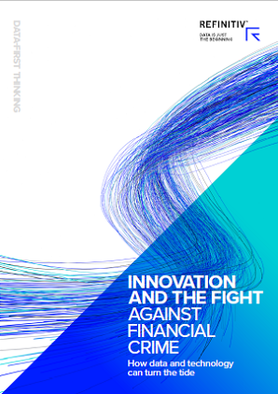Significant advancements in technology, facilitated by innovations such as artificial intelligence (AI), machine learning (ML), cloud computing, robotics and the Internet of Things, are already under way. These technologies are enabling intelligence to be gathered from vast and often disparate data sets which together with rapid advances in data science, are transforming the approach to compliance, streamlining processes such as Know Your Customer (KYC) and helping to uncover previously hidden patterns and networks of potential financial crime activity.
At the heart of this technological revolution is the need to have trusted data, accurate and relevant information, so that the technology can help the people who are responsible for compliance and risk management make informed decisions. Regulators expect that organizations will be able to explain how the technology they use helps them to make risk-based decisions, they are on record as saying black box technologies will not be acceptable. Additionally, the technology and data used must be compliant with the rapidly changing privacy landscape in which all organizations operate.
Against that background, what does our independent survey of over 3,000 managers in compliance-related roles tell us about the current and potential uses of such emerging technologies?
Firstly, it clearly shows that, if we are to win the fight against financial crime we need to do more to invest in these new technologies as well as the people who are charged with managing compliance and risk within their organizations. We will only win by harnessing the combined power of smarter machines and smarter humans.
As with previous surveys, this survey reveals that many companies still need to address fundamental risk management issues. Of organizations surveyed, 72% say that they were aware of financial crime within their global operations over the last 12 months. However half (51%) of customer, supplier and partner relationships have not had formal due diligence checks when being onboarded; creating an environment in which criminal activity can flourish.
It also reveals that in many organizations there are significant tensions between meeting compliance obligations and preventing financial crime, and growing the business often resulting in poor due diligence processes.
The survey shows, however, that innovation is already having an impact with organizations that use new technologies being almost twice as successful at performing KYC checks on the identity of clients.
Finally, it tells us that more is being done to realize the future potential of effective technology powered by trusted data, with an increase of over 50% in investment in improvements in detecting and preventing financial crime over the next 12 months with investment in technology being the biggest focus.
The report also includes interviews with leaders from regulators and financial services to understand their perspectives of how technology and trusted data can help us in the fight against financial crime.
It is clear from this report that as criminals become increasingly connected and innovative, businesses exposed to financial crime threats need to ensure that they are maximizing the use of technology, trusted data and the expertize of their people to protect themselves. Refinitiv is committed to investing in its people, data and technology to support our customers in the fight against financial crime.



